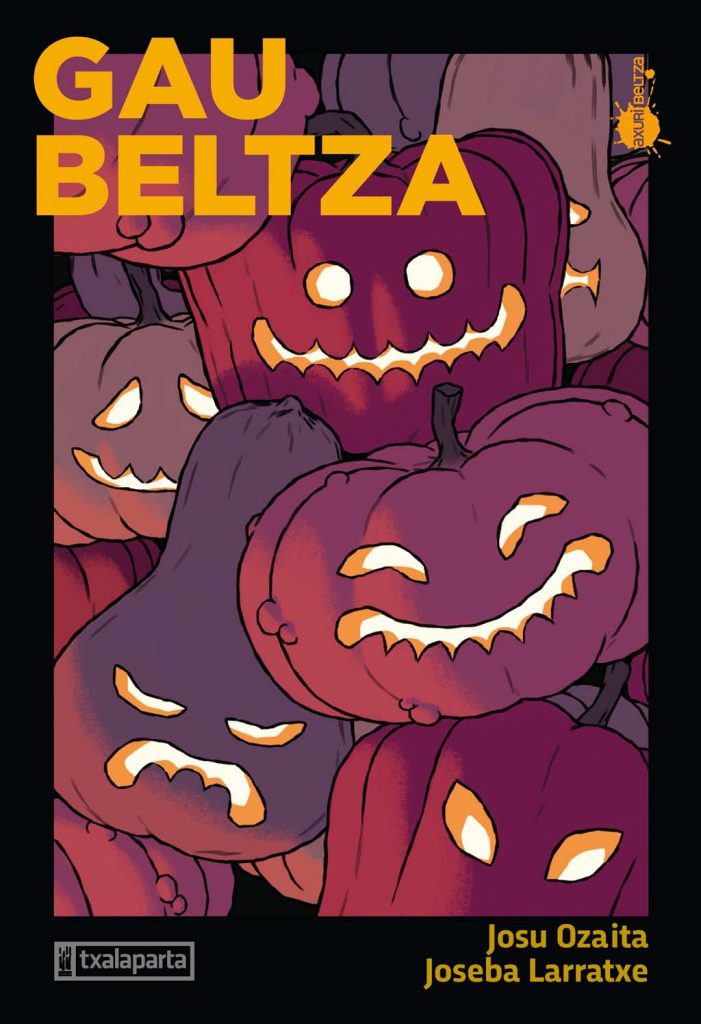Menu

Anari amorratua dago, etxean ez baita giro: Halloween ospatu nahiko luke, baina amak ezetz dio, jai arrotza dela eta ez duela baliorik sustatzen. Bere inguruan giroa txartzen denean, Anarik itsasoa du ihesbide; bertan lortzen du bakea, surfa lagun. Azkenaldian maiz itsasoratzen da. Ez du etsiko, ordea, eta eskolako lan baten ondorioz, aitonak kontatuko dio umetan haiek ere ospatzen zutela antzeko egun bat, eta kalabazak lapurtzen, apaintzen eta herriko hainbat txokotan uzten zituztela. Auzoak beldurtzeko bihurrikeria bat zen. Anarik irrikaz lotuko ditu hariak, eta lagunekin batera gaurkotuko dute arbasoen ohitura bat: Gau beltza.
Anari está revuelta, en casa no tienen tregua: quisiera celebrar Halloween, pero su madre se niega rotundamente, dice que es una fiesta yanqui y que no aporta valor alguno. En ese tipo de situaciones, Anari huye al mar; surfear es su forma de evadirse. Últimamente viene mucho al mar. Pero no tiene intención de desistir, y gracias a un trabajo escolar, su abuelo le contará que de joven ellos también celebraban un día similar, que robaban, vestían y escondían calabazas por el pueblo. No era más que una chiquillada para asustar al vecindario. Emocionada, Anari atará hilos y revivirá junto a sus amigos una costumbre ancestral.
Anari is upset. At home there is no truce: she would like to celebrate Halloween, but her mother flatly refuses by saying it is a Yankee holiday that brings nothing new. On such occasions, Anari flees to the sea. Surfing is her way of escaping. In these times, she goes often to the sea. Nevertheless, she has no intention of giving up. Thanks to a school assignment, her grandfather tells her that when he was young, they also celebrated a similar day, during which they robbed, dressed up and hid pumpkins all around town. Just a kids’ game to scare the neighborhood. Thrilled, Anari will bring threads together and, with her friends, relive an ancestors’ custom.

Txalaparta is the name of a free, independent Basque publisher. We publish around 40 books per year, mainly in Basque and Spanish: Basque and world literature, political and historical non-fiction, social criticism, leftist classics, historical encyclopaedias. They are all contained within different collections: Gebara, for international fiction and non-fiction; Orreaga, for Spanish fiction and non-fiction; Amaiur, Basque fiction and non-fiction; Cuerpo y Mente, which includes non-fiction about health, nature, diet etc.; TXO!, the Basque arm of OQO, encompassing children’s literature in Basque; Clásicos, with special editions of classic texts; Literotura, the only collection of erotic literature in Basque; Rabel, which includes the biographies of musicians and artists and some of their works; Kortazar, novels by American authors of Basque origin; and Axuri Beltza, small-format children’s literature.



© Euskal Editoreen Elkartea